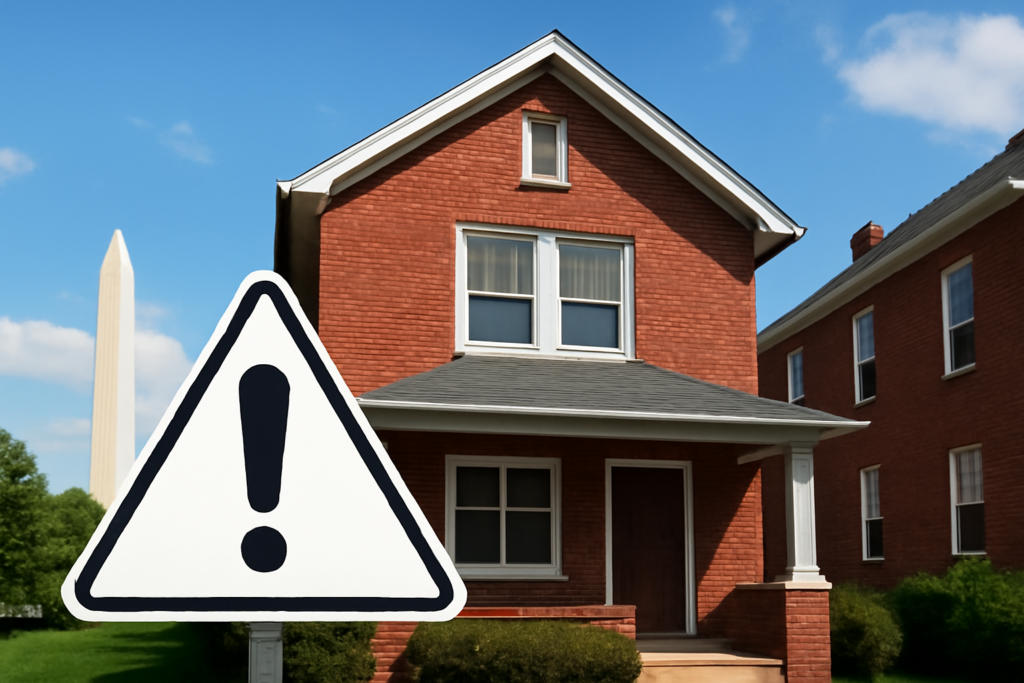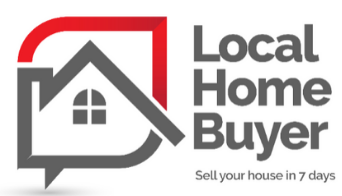How to Sell a House With Code Violations in Washington DC

Introduction
When searching for “How to Sell a House with Code Violations in Washington DC,” you’re likely facing a stressful situation. You probably own a home in need of repairs, and you’ve just been made aware of some building code violations, either from a recent inspection or a complaint from a neighbor or local authorities. The idea of dealing with violations while trying to sell your property is overwhelming. You might be wondering: How do you fix these violations before selling? Will it be expensive? What are your options if fixing them isn’t feasible? Or, should you sell the property as-is?
This is a common concern, especially in a city like Washington DC, where building codes are strict, and noncompliance can result in costly fines, delays, or even the inability to sell the home. You’re looking for practical solutions that don’t require you to break the bank, and that allow you to move forward with selling. You want to know the exact steps to follow if you decide to sell a house with violations. Can you sell to a cash buyer? Is it easier than traditional methods? You’re not necessarily looking to get rich from the sale, but you do want the process to be smooth, fast, and free of major headaches.
In this blog, we’ll explore the best strategies for selling a house with code violations in Washington DC. You’ll learn about the benefits and drawbacks of different approaches, including the option of selling to a real estate investor who buys houses for cash. By the end of this guide, you’ll be well-informed to make the decision that’s right for your situation—whether you want to sell quickly, or just want to be aware of what you’re up against before listing the house.
How to Sell a House with Code Violations in Washington DC
Selling a house with code violations in Washington DC can seem like an impossible task, but it’s not. Many homeowners in the District face the challenge of selling a home that doesn’t meet local building codes. In fact, over 20% of homes in some urban neighborhoods are flagged for code violations at some point. These violations can range from simple issues like plumbing or electrical mistakes to more severe concerns, such as structural deficiencies. Washington DC, with its rigorous property regulations, makes these problems especially frustrating for sellers.
Why Does This Matter?
When you have code violations, it can complicate the selling process. Buyers may walk away if they learn that the house doesn’t comply with local codes, or they may request a significant reduction in price to cover repair costs. Traditional buyers may also be discouraged by the idea of dealing with permits, inspections, and contractors. Additionally, selling a property that has unresolved issues might delay your closing process, causing you even more stress.
On the other hand, selling to a real estate investor who buys houses for cash can provide a smoother and quicker solution. You don’t need to worry about repairing the violations or dealing with long negotiations. Investors are experienced in purchasing homes with violations and typically buy houses “as-is,” which means you can avoid dealing with permits, inspections, or repairs.
Let’s take a deeper dive into the process and explore how you can move forward when selling a property with code violations in Washington DC.
Understanding Code Violations in Washington DC
What Exactly Are Code Violations?
Code violations refer to any discrepancies between the current condition of the house and the regulations set forth by local building codes. In Washington DC, these codes cover everything from electrical wiring to plumbing, structural integrity, and even how homes are used or zoned. If a homeowner has made changes to the property without the proper permits, those modifications are considered violations. Additionally, if a house has been neglected or damaged over time and isn’t up to code, that’s another potential violation.
Common Types of Code Violations
Some common building code violations that homeowners in Washington DC face include:
- Unpermitted Additions: Homeowners may have added a deck, finished a basement, or expanded a room without filing for permits.
- Electrical Problems: Outdated or improperly installed wiring can result in safety concerns.
- Plumbing Violations: Issues like leaking pipes or improper water drainage can lead to plumbing code violations.
- Structural Issues: Cracks in the foundation, failing load-bearing walls, or sagging roofs can all be violations of building codes. For more information on structural regulations, refer to The International Code Council.
- Health and Safety Violations: Problems like mold or lack of proper ventilation may also be considered violations.
Each violation could have a significant impact on how easily you can sell your home.
Will a Code Violation Affect the Sale of Your House?
When you sell a house with code violations, buyers are likely to be cautious. Many buyers won’t want to deal with the hassle of fixing code violations, especially if the costs are high. Some might demand a reduced price to cover repairs, while others might back out entirely if they’re unable to obtain financing for a property that’s out of compliance with local codes. In Washington DC, buyers may have to show proof that the home complies with all necessary codes before the deal can close, or the sale may be delayed while inspections and repairs are made.
If you find yourself in this situation, selling to a cash buyer who specializes in buying homes with code violations could be an ideal solution. For more details on how this could benefit you, check out our page on the Benefits of Selling a House With Unpermitted Work for Cash in Virginia.
Selling a House with Code Violations the Traditional Way
When trying to sell a house with code violations in Washington DC, you have the option of listing it traditionally. However, this path comes with its challenges.
The Challenges of Selling a House with Code Violations Traditionally
- Costly Repairs and Updates: You may need to fix the code violations to make your house marketable. This can involve hiring contractors, obtaining permits, and paying for the necessary repairs. Depending on the scope of the violations, these costs can range from hundreds to tens of thousands of dollars.
- Extended Timeline: Fixing code violations can delay your sale significantly. It may take weeks or even months to bring your house up to code, especially if the violations are major or require extensive permits. If you’re unsure of the costs and timeline involved, consider reviewing resources like HomeAdvisor to get an idea of typical repair expenses.
- Complicated Negotiations: Even if you manage to sell the house, buyers may request a steep price reduction or ask you to pay for repairs. Additionally, the house may have to undergo additional inspections before closing, prolonging the process.
While this approach may work for some sellers, the financial burden and time commitment can be overwhelming for many. If you are looking for an alternative way to sell your house quickly without these issues, check out our page on How to Sell a House for Cash With Unpermitted Work.
Selling a House with Code Violations to a Real Estate Investor
One of the best options for homeowners facing code violations in Washington DC is to sell to a cash home buyer. Investors who specialize in buying houses as-is, including those with code violations, can offer a much smoother, quicker solution.
Why Sell to a Real Estate Investor?
- No Repairs Necessary: When you sell to an investor, you’re selling your house “as-is.” You won’t have to worry about fixing the code violations or making costly repairs. Investors are accustomed to buying properties with these types of issues, so they’re willing to take on the work themselves.
- Quick Closing Process: Investors often close in as little as 7-14 days. This can be especially valuable if you’re in a hurry to sell your house or avoid foreclosure. In contrast, a traditional sale can take months to finalize, especially if you’re trying to fix the violations first.
- Cash Offer: Investors make cash offers, which means you won’t have to worry about financing falling through, inspections, or appraisal issues. The sale is much more straightforward and secure.
- Avoiding Real Estate Agent Commissions: Selling traditionally often involves real estate agent fees, which can take 5-6% of the final sale price. By selling to an investor, you can avoid these additional costs.
Example: How Much Could You Save?
Let’s say your property has electrical and plumbing violations, and repairing them could cost upwards of $15,000. If you sell traditionally, you’ll have to either spend this money fixing the violations or lower your asking price to accommodate for them. However, by selling to an investor, you can avoid these costs completely and walk away with a cash offer that fits your needs.
The Drawbacks of Selling to an Investor
While selling to a real estate investor has its advantages, it’s not the right choice for everyone. The main drawback is that investors typically offer below-market value for properties, especially those with significant issues like code violations. If your home is in excellent condition, you might not want to take this route. However, for homeowners dealing with violations, this may be the quickest and least expensive option in the long run.
Conclusion: Should You Sell a House with Code Violations to Local Home Buyer?
Selling a house with code violations in Washington DC may feel overwhelming, but it doesn’t have to be a complicated process. If you’re facing costly repairs or time constraints, selling to a cash buyer like Local Home Buyer can be a fast, hassle-free solution. At Local Home Buyer, we specialize in buying houses as-is, including those with code violations, so you don’t have to worry about expensive repairs or dealing with lengthy negotiations.
We understand that you want to sell your home quickly and with minimal stress. With our cash offers, you can skip the traditional home-selling process and close in as little as 7-14 days, all while avoiding realtor fees and unexpected costs. While selling to an investor may involve receiving a below-market offer, the peace of mind and speed that Local Home Buyer provides often outweigh the hassle of repairing and listing your home the traditional way.
If you’re ready to sell your house as-is, contact Local Home Buyer today for a no-obligation cash offer. We’re here to help you move forward quickly and efficiently, no matter the condition of your property.
